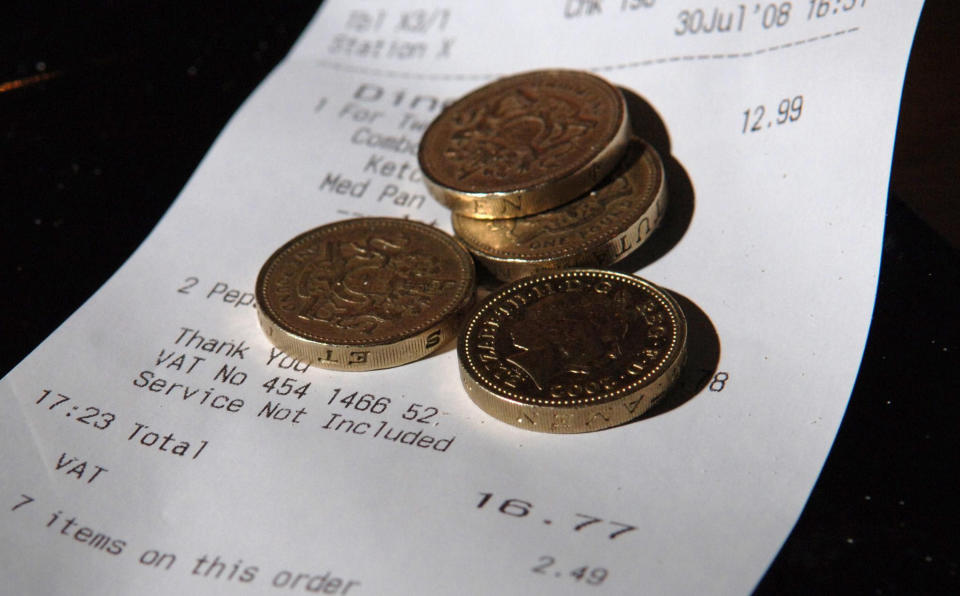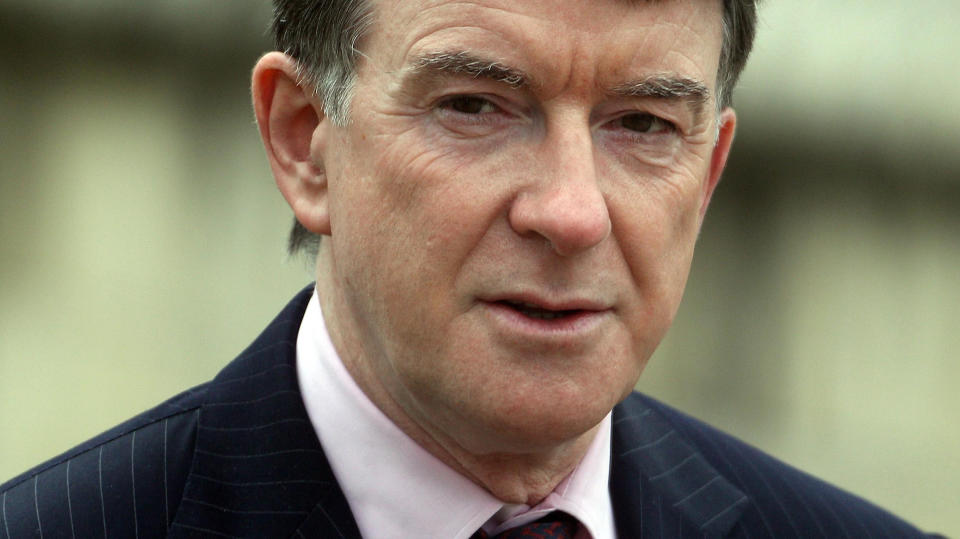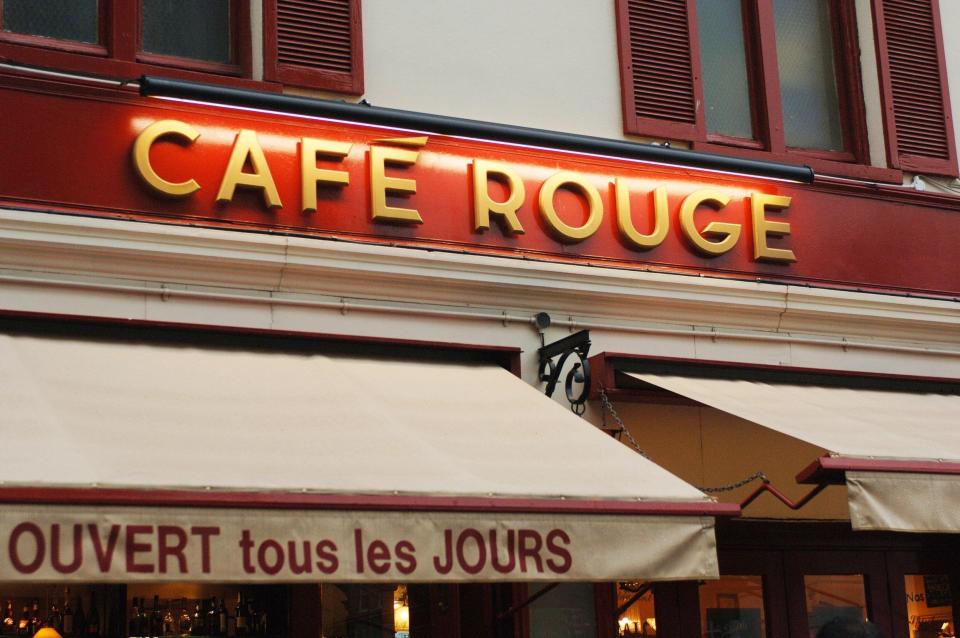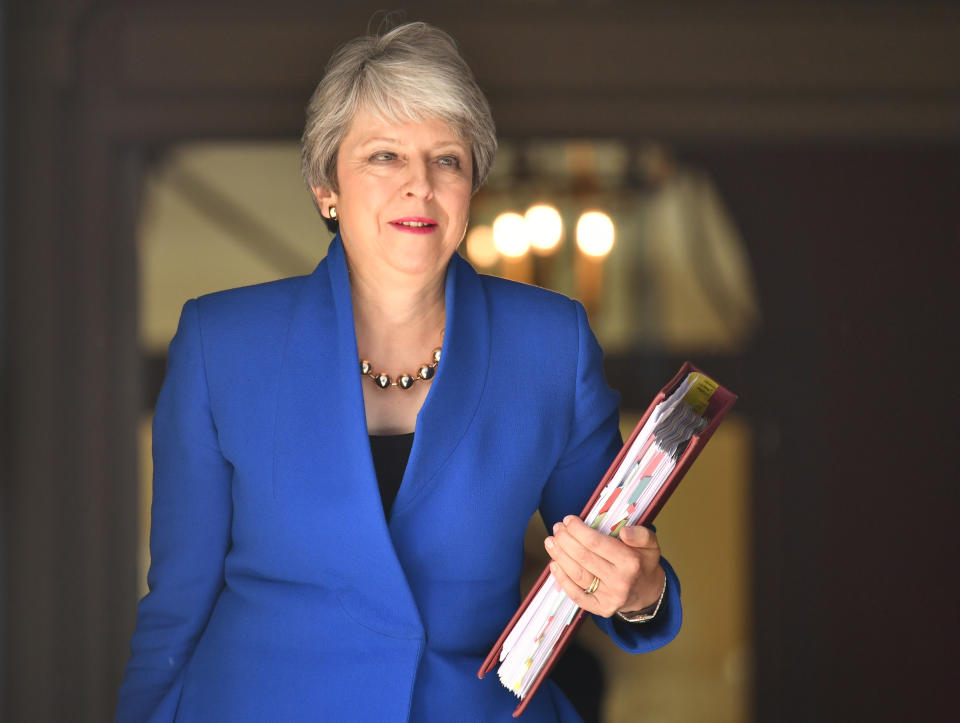Revealed: MPs' two decades of failure to stop restaurants pocketing staff tips

The rise of card and contactless payments has made life easier for many consumers, who never have to worry about carrying the right amount of cash.
But the decline of cash has made life harder for staff in restaurants, bars and other industries where many workers rely on tips on top of their wages.
Tips left to a waiter or other worker in cash legally belong to them, but service charges or tips paid on cards legally belong to their employer.
The shift to a cashless society has allowed many well-known restaurant chains to exploit the gap often without consumers’ knowledge, taking a large cut of service charges and even using them to pay wages.
The government is under fire for “delay after delay” to a law promised almost exactly a year ago at the last Conservative conference to ensure staff receive their full tips.
But analysis by Yahoo Finance UK shows politicians’ failure to stop workers losing out goes even further back, spanning more than two decades and five different prime ministers.
Labour and Conservative governments alike have repeatedly failed to stop employers taking money almost always intended solely for their staff.
READ MORE: Ban on restaurants taking staff tips 'kicked into long grass'
Two decades of ‘delay after delay’

1990s – Court rules card tips belong to restaurants
A High Court battle fought by four waiters in 1994 “essentially set a precedent that tips and services charges paid on card belonged to the employer,” unlike cash tips, according to Unite officer Turnbull.
He said the decision, which the waiters even took to a European court, encouraged firms to use tips to pay staff wages as credit cards and then chip-and-pin gained popularity.
1999 – Blair government loophole allows wages to be paid via tips
Former prime minister Tony Blair’s New Labour government guaranteed workers a minimum wage with a widely praised law.
But a “loophole” allowed firms to keep siphoning off card tips into paying the minimum wage by classing tips and service charges as pay
Former Labour chairman Ian McCartney later admitted the government had caved into lobbying by the hospitality industry.
He told the Independent a loophole had been a “compromise” with firms to stop them undermining the law, but expressed “regret” at how firms had used it.
2000s – HMRC struggles with crackdown
HMRC soon realised the use of tips to pay wages meant many firms were paying less national insurance, and its ‘Operation Gourmet’ crackdown from 2003 caused an outcry among firms.
But it backed down in 2006 after admitting the rules did not require insurance contributions on tips shared out independently of firm management.
2008 – Scandal over restaurants using tips for wages under Brown
Many well-known restaurant chains were found to be paying part of staff’s wages with card service fees, with Unite, the Mirror and Independent newspapers campaigning to ban the practice.
Government officials estimated almost 45,000 workers could be losing out from their tips being used for their basic pay. One restaurant was even accused of paying their entire wage bill from tips.
Surveys at the time showed the public strongly believed firms should not take a cut of tips, building a strong case for action to finally resolve the issue.
2009 – Loophole closed but union warns staff still won’t get tips

More than a decade after the minimum wage was passed, the loophole was finally closed with a new law coming into force. Labour minister Peter Mandelson said “tips should be paid to the worker” on top of pay.
But officials were warned by the Unite union their new law still gave firms an “area to exploit.” It said firms could not regulate themselves, and some had even “boasted they will simply find another way of taking tips.”
A new code of best practice was also drawn up, urging restaurants to highlight how service charges were distributed. It was hoped it would increase workers’ share of tips through consumer pressure, as it encouraged restaurants to clearly display tipping policies.
But it was only voluntary after New Labour reportedly shelved plans to force it on firms.
2010 – Cameron government axes budget promoting transparency on tips
The government briefly secured publicity for its ‘Who Gets the Tip’ campaign for restaurant transparency over tips in early 2010, promoting takeup of the voluntary code.
But a document seen by Yahoo Finance UK reveals new prime minister David Cameron’s government then axed the budget for promoting better restaurant behaviour within a year of the code’s launch.
READ MORE: UK government urged to pass law against class discrimination
The budget was a victim of the new Conservative-Liberal Democrat coalition government’s austerity drive.
One minister later boasted a 50% drop in the government’s marketing spending proved “cutting out sometimes wasteful and unnecessary” campaigns could make big savings fast.
A subsequent official report predictably found the code was not widely used, and most workers and consumers surveyed were not even aware of it.
2015 – Action pledged after scandal over restaurants taking fees from tips

Another major scandal erupted in 2015 as many high street restaurant chains were exposed taking fees from tips, prompting then business secretary Sajid Javid to pledge “action on tipping abuse” and launch an investigation.
Cafe Rouge and Bella Italia were among those reported to be deducting 10% from card service charges. Both now state they charge 2.5% and support UK Hospitality’s code.
2016 – Javid sets out plans for ‘legislation if necessary’
Javid began consulting on various proposals in May, saying the government was “very clear” it wanted workers to keep their tips.
He said the government would introduce a new law “if necessary” to stop employers deducting from tips, charging waiters fees based on sales and ignoring the government code by making it compulsory.
2017 – MPs’ anger as government pledge action ‘in due course’
More than 30 MPs wrote to the government in July demanding answers one year after its consultation closed, as it had failed to publish the standard follow-up report detailing its plans.
A BEIS spokesman promised a response “in due course” in August. Business minister Margot James then praised restaurants’ “significant improvement” in December, saying the government had “publicised the issue.”
2018 – New law ‘at the earliest opportunity’ after fresh scandal over staff reportedly charged to work

Some restaurants were accused of “charging workers to work” after a Bristol Post investigation in January, while workers at two TGI Fridays branches also went on strike in a row over tips.
James’ replacement Andrew Griffiths made another pledge to “legislate if necessary” in March, but only “if the industry does not act” and said firms “may need” small fees for admin costs.
The Independent reported in July officials had not even drafted a response to the 2016 consultation pledging reform, two years on.
By October May’s government had finally promised a new law but only “at the earliest opportunity,” with another minister Greg Clarke admitting “excessive deductions” were still being made.
2019 – New law promised ‘as soon as possible’
Legislation was reportedly delayed in February, and four months later yet another business minister, Kelly Tolhurst, could still only pledge action “as soon as possible” as part of wider workplace reforms.
Two sources involved in the legislation told Yahoo Finance UK work is ongoing behind the scenes, with one citing “good progress.”
But there is still no sign of May’s law one year on, and the government has still not even published a response to its 2016 consultation on the options for reform.
More than three years after officials finished gathering evidence, the relevant web page still encourages stakeholders to “visit this page again soon to download the outcome to this public feedback.”

Unite’s chief hospitality organiser Dave Turnbull suggested governments had delayed action so long that workers increasingly faced new threats to their tips, and said banning employer deductions alone was not enough.
Turnbull, a longstanding campaigner on the issue, warned a new scandal could be bubbling. He claimed senior staff and accountancy firms were earning “substantial sums” from tip systems that are nominally run by staff themselves at some major restaurant firms.
“One of the slogans we’ve used throughout the campaign is – ‘why are we waiting.’ That’s what staff in restaurants, bars and hotels are saying.”
READ MORE: One in seven hotel and restaurant staff ‘receive no paid holiday’

 Yahoo Finance
Yahoo Finance 